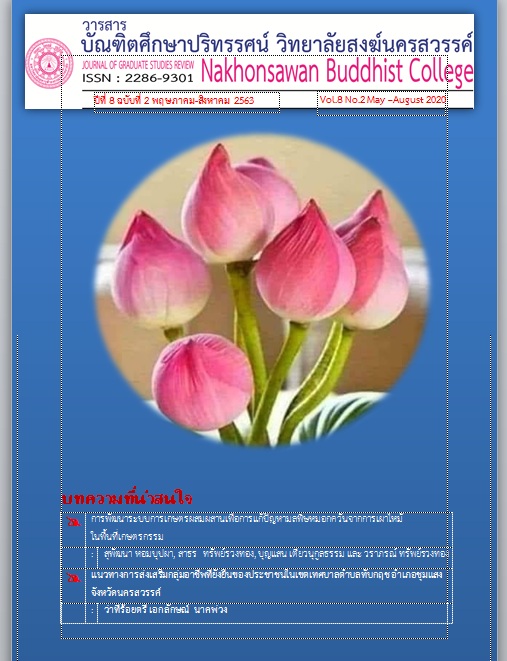ผลการจัดการศึกษาของศูนย์พัฒนาเด็กเล็กสังกัดองค์การบริหารส่วนตำบล จังหวัดนครนายก
Main Article Content
บทคัดย่อ
การวิจัยครั้งนี้มีวัตถุประสงค์เพื่อ 1) ศึกษาผลการจัดการศึกษาของศูนย์พัฒนาเด็กเล็ก สังกัดองค์การบริหารส่วนตำบล จังหวัดนครนายก 2) หาแนวทางพัฒนาการจัดการศึกษาของศูนย์พัฒนาเด็กเล็กสังกัดองค์การบริหารส่วนตำบล จังหวัดนครนายก
ประชากรที่ใช้ในการตอบแบบสอบถาม ได้แก่ หัวหน้าศูนย์พัฒนาเด็กเล็ก ของศูนย์พัฒนาเด็กเล็กสังกัดองค์การบริหารส่วนตำบล จังหวัดนครนายก จำนวน 96 คน และผู้ให้ข้อมูลในการสัมภาษณ์ ได้แก่ ผู้บริหารด้านการจัดการศึกษาของศูนย์พัฒนาเด็กเล็ก สังกัดองค์การบริหารส่วนตำบล จังหวัดนครนายก ที่มีผลการประเมินการจัดการศึกษาของศูนย์พัฒนาเด็กเล็ก ระดับมาก อำเภอละ 2 คน ใน 4 อำเภอ จำนวน 8 คน เครื่องมือที่ใช้ คือ แบบสอบถาม สถิติที่ใช้คือ ค่าความถี่ ค่าร้อยละ ค่าเฉลี่ย ค่าส่วนเบี่ยงเบนมาตรฐาน และแบบสัมภาษณ์ ใช้การวิเคราะห์เชิงเนื้อหา (Content Analysis)
ผลการวิจัยพบว่า 1) ผลการจัดการศึกษาของศูนย์พัฒนาเด็กเล็ก สังกัดองค์การบริหารส่วนตำบล จังหวัดนครนายก ในภาพรวมอยู่ในระดับมาก เมื่อพิจารณาเป็นรายข้อพบว่า ศูนย์พัฒนาเด็กเล็กมีการสร้างความสัมพันธ์ระหว่างศูนย์พัฒนาเด็กเล็กร่วมกับชุมชน มีค่าเฉลี่ยสูงที่สุด รองลงมา ศูนย์พัฒนาเด็กเล็กมีความร่วมมือกับชุมชนและท้องถิ่นเพื่อพัฒนาการจัดการเรียนการสอน และศูนย์พัฒนาเด็กเล็กสนับสนุนการใช้แหล่งเรียนรู้ และภูมิปัญญาในท้องถิ่นในการจัดการเรียนการสอน มีค่าเฉลี่ยต่ำที่สุด 2) แนวทางพัฒนาการจัดการศึกษาของศูนย์พัฒนาเด็กเล็กสังกัดองค์การบริหารส่วนตำบล จังหวัดนครนายก ด้านการบริหารงานวิชาการ ควรมีการพัฒนาระบบงาน และข้อมูลสารสนเทศในการวางแผน ด้านบุคลากร ควรมีการกำหนดกรอบอัตรากำลังให้เหมาะสมกับงาน ด้านอาคาร สถานที่ สิ่งแวดล้อมและความปลอดภัย ควรปรับปรุงพัฒนาสถานที่ให้เอื้อต่อการเรียนรู้ ด้านงานวิชาการและกิจกรรมตามหลักสูตร ควรมีการนิเทศและช่วยเหลือนักเรียนอย่างเป็นระบบ ด้านการมีส่วนร่วมและการสนับสนุนจากทุกภาคส่วน ควรทำหลักสูตรให้สอดคล้องกับสังคมวัฒนธรรม และภูมิปัญญาท้องถิ่น ด้านส่งเสริมเครือข่ายการพัฒนาเด็กปฐมวัย ควรมีการส่งเสริมและพัฒนาเครือข่ายทั้งภายใน และภายนอกหน่วยงานให้มีประสิทธิภาพสูงสุด


